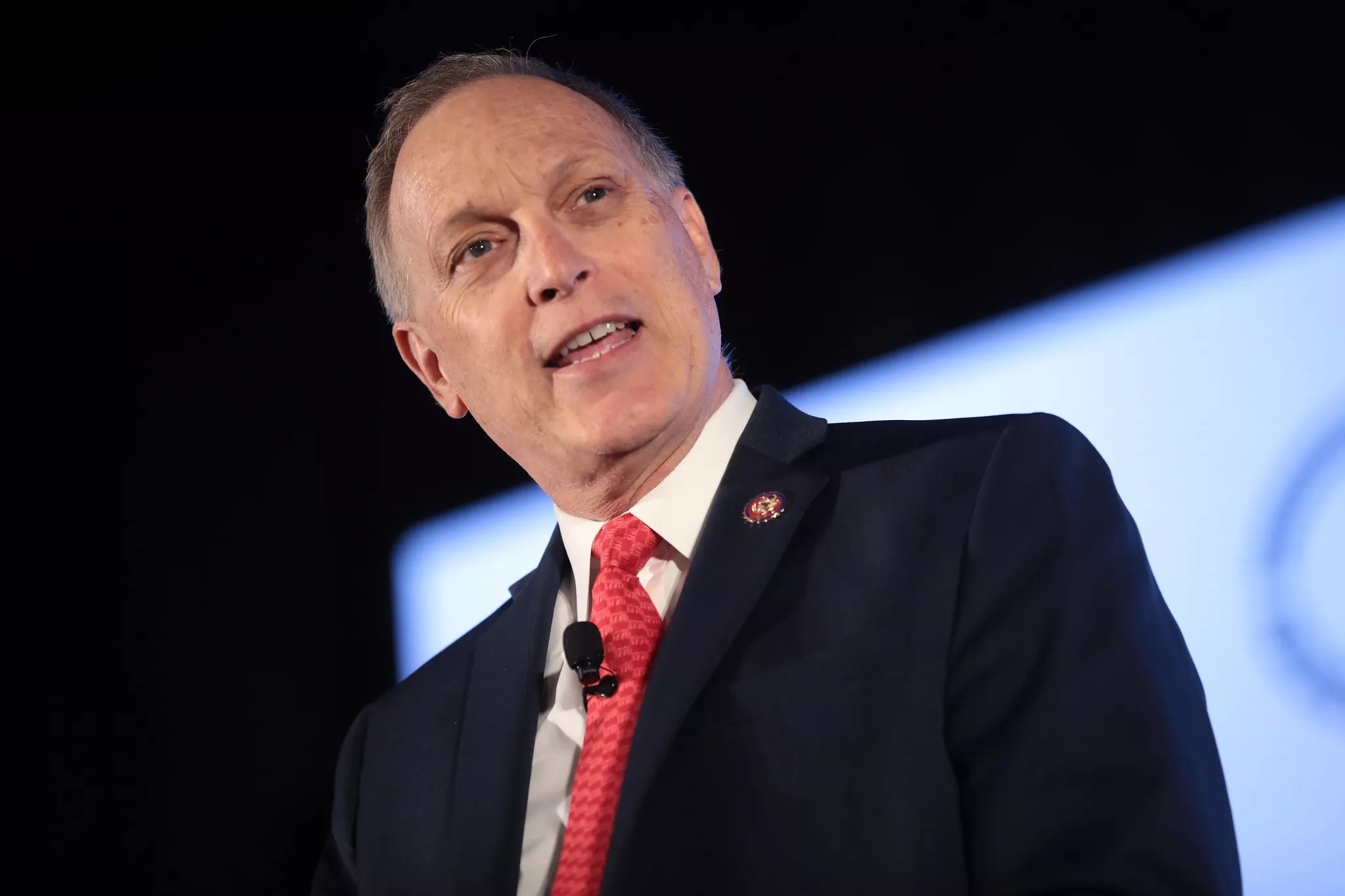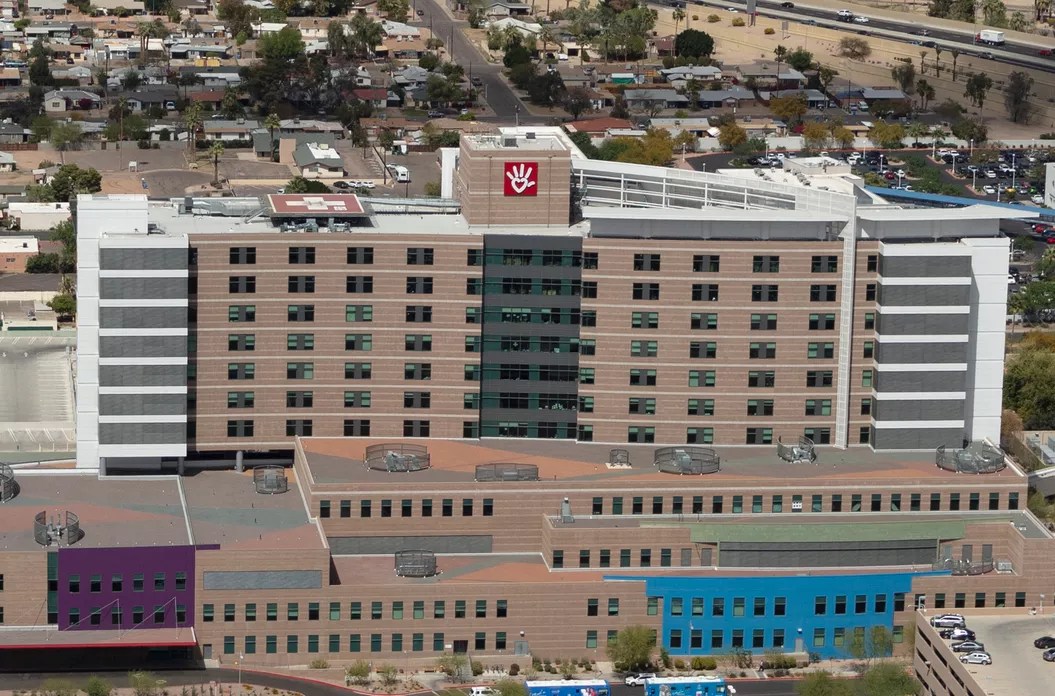
Gage Skidmore/Flickr/CC BY-SA 2.0

Audio By Carbonatix
For a guy determined to become the highest elected official in Arizona, Rep. Andy Biggs sure loves hitting the state in the kneecaps with a crowbar.
The 2026 election cycle is only just heating up, but the right-wing Arizona congressman is the odds-on favorite to claim the Republican nomination for governor. If he defeats MAGA convert Karrin Taylor-Robson in the primary, he’ll get his crack at unseating Democratic Gov. Katie Hobbs.
If he does win Hobbs’ office and veto stamp, though, he’ll inherit a state that he helped screw over. Last week, Biggs voted to pass Donald Trump’s so-called “One Big Beautiful Bill,” a 900-page budget measure that just about every nonpartisan analysis suggests will be terrible for the country. For months, local nonprofits, community organizations and politicians have been sounding the alarm on the devastating consequences that the bill could have on Arizonans.
It gives Immigration and Customs Enforcement the largest budget of any domestic law enforcement agency. It severely cuts Medicaid and food assistance in ways that will negatively affect millions. And it blows a huge hole in the national debt, despite the supposed fiscal conservativeness of the Republicans who passed it. All so Trump could push through another massive tax cut for the richest corporations and people in the United States.
Biggs, the far-right congressman representing much of the East Valley, was one of those yes votes. That’s despite his expressed concerns about its effects on the national debt. On top of that, by severely cutting Medicaid and food assistance, Biggs has left Arizona to pick up where federal funding falls off. And Arizona doesn’t have the money.
“It’s billions of dollars that we don’t have,” Hobbs told reporters. “Even if we cut every single thing in the state, we don’t have the money to backfill all these cuts.”
Biggs wasn’t the only Arizona Republican to vote in favor of the bill. Every other Republican congressman in the state did so, too. That includes three others – Eli Crane, David Schweikert and Juan Ciscomani – who at least gestured at concerns about the bill’s impact on the budget before voting it into law.
Those GOP representatives deserve their fair share of criticism, but Biggs is the only one of them hoping to convince Arizonans – many of whom will now be worse off because of him – that he should be governor. Phoenix New Times reached out to Biggs’ office to ask him to discuss the bill and its effects on Arizona, but he did not respond.
Here are the biggest ways Biggs voted to screw over people in Arizona.

In Arizona, nearly 330,000 Arizonans would lose access to their health insurance.
Jan Sonnenmair/Getty Images
Medicaid cuts
Though the budget bill cuts far more in taxes than it cuts in spending, it slices enough off Medicaid and food assistance – that’s food stamps, if you’re of an older generation – to severely hurt hundreds of thousands of people in Arizona.
The Medicaid cuts come mainly in the form of stiffened work requirements for low-income people who hope to qualify for the state-backed health insurance. Sounds fair in theory, except that such requirements historically deprive qualified people of health coverage by forcing them to jump through additional bureaucratic hoops. If you’ve ever tried to cancel a gym membership, you get the idea. A lot of people who need the assistance – elderly people, people with disabilities, low-income people who can’t access a computer – can’t figure it out.
The nonpartisan Congressional Budget Office estimated that 16 million Americans would become uninsured by 2034 as a result of the Medicaid cuts, which take effect next year. In Arizona, nearly 330,000 Arizonans could lose access to their health insurance, according to the left-leaning Arizona Center for Economic Progress. In Biggs’ congressional district, nearly 86,000 people are now at risk of losing their health care over the bill.
In a YouTube video posted after the House of Representatives gave the bill final passage, Biggs called the cuts “pretty good” and claimed the Medicaid cuts will attack “those money-laundering programs” and the “fraudulent schemes” that are “going on in programs like Medicaid.” While there have been Medicaid scams in Arizona and elsewhere, increased work requirements to qualify for coverage would have done little to curb them. A paper by Georgetown University professor Andy Schneider called the premise that Medicaid is rife with waste and abuse “false” and said the “thinking is dangerously wrong.”

In Arizona, an estimated 190,000 people may lose access to food assistance.
Jacob Tyler Dunn
Food assistance cuts
Thousands of Americans will also lose access to food stamps under SNAP, which stands for the Supplemental Nutrition Assistance Program. Like with Medicaid, the budget bill stiffens work requirements to qualify for the program, specifically by increasing the ages that must meet work requirements from 18-54 to 18-64. The bill also passes some of the burden of funding SNAP to individual states.
That means more families that rely on the program to put food on the table will go hungry. The CBO estimated that more than three million Americans will lose access to food stamps by 2034. In Arizona, an estimated 190,000 people may lose access to the program, according to the Arizona Center for Economic Progress.

Hospitals that do a lot of their business through Medicaid will confront funding shortfalls.
Photographs in the Carol M. Highsmith Archive, Library of Congress, Prints and Photographs Division
Hospitals closing
Less Medicaid money means less money for hospitals, especially rural ones. And less money for hospitals will make it harder for them to keep their doors open, resulting in a massive trickle-down effect on Arizona’s health care system.
The Medicaid cuts will put 55% of the state’s hospitals in a deficit, leading to likely cuts in services such as obstetrics and behavioral health, according to estimations by the Arizona Hospital and Healthcare Association. In rural areas of the state, hospitals could close entirely. According to University of North Carolina researchers, five hospitals are at risk of closure in Arizona due to the legislation.
If you’re pregnant or need therapy in the hinterlands of Arizona when the cuts hit, good luck. Those services might be a lot harder to find than they are now.
This will affect employment and the economy as well. Cutting Medicaid “restricts the U.S. economy,” said Joseph Palomino, the director of the Arizona Center for Economic Progress. Nearly one in five dollars of economic output in the U.S. is in health care spending, and Medicaid is a significant part of the latter. One in seven jobs in Maricopa County, where Biggs’ district is located, is in health care.
“We are potentially looking at stalling one of the major economic engines of the U.S. economy,” Palomino said.

Phased-out tax incentives for green energy projects could cost Arizona nearly 69,000 jobs and billion in investments,
City of Phoenix
Arizona energy products get a kick in the groin
The budget bill also rolls back aspects of the Inflation Reduction Act, signed by President Joe Biden in 2022. Trump’s bill phases out tax credits for green energy projects, like those that use solar or wind power. As a result, thousands of jobs will be slashed and businesses in those industries will go under. Federal tax credits for electric vehicles, solar panels and heat pumps will also be eliminated for individuals. This could cost Arizona nearly 69,000 jobs and $58 billion in investments, according to Hobbs’ office.
These cuts will disproportionately impact Republican-represented districts, including Biggs’. His district has received $4.1 billion from clean energy investments since the IRA was passed, making it one of the top 10 districts to receive the most financial benefits from the legislation. Despite the financial benefits the IRA has brought to his district, Biggs celebrated the cuts in his YouTube video. He raved about the caucus getting rid of “about 50% of” the IRA, resulting in a “90% reduction in the subsidies for wind and solar,” he said. “That’s a good thing, too.”

Middle-income households may receive a 0 tax cut as a result of the bill, but high interest rates will likely cancel that savings out.
eyegelb/Getty Images
Arizona’s interest rates will rise
Despite Biggs’ excitement over cuts to jobs and business in his backyard, the financial woes of the bill don’t stop there. “The major concern of this bill is actually the deficit,” Palomino said.
Biggs is a traditional “deficit hawk,” and the bill’s impact on the deficit – basically, the difference between what the country spends and what it collects in taxes – is perhaps the only aspect of the bill that concerned Biggs in his July 3 video. With “the urging of leadership,” Biggs said, “we ended up with over a trillion dollars worth of reductions.” But his hesitancy is clear. That amount “is only $100 billion over 10 years,” Biggs continues, before shrugging and giving a wincing face to the camera. “That’s nice, that’s good,” he said. “But over that same period, we’ll probably increase the deficit.”
Spending more than you take in requires borrowing, and that requires increasing the national debt. But by how much? The bill could add between $3.5 and $4.2 trillion to the national debt, which could mean higher interest rates, mortgage rates, small business loans and credit card rates for everyday Arizonans, Palomino said. Middle-income households may receive a $400 tax cut as a result of the bill, but high interest rates are likely to “offset any of the benefits.”
Prior to this bill, the U.S. was already in a “high-interest rate environment” that was “already destabilized” with inflation from tariffs and mass deportations, which are influencing the U.S. market, Palomino said.
“We are in a situation where people are already pretty credit-constrained,” Palomino said. “This bill could put Arizona into a very difficult fiscal situation.”